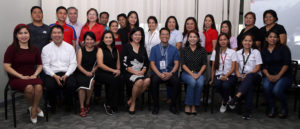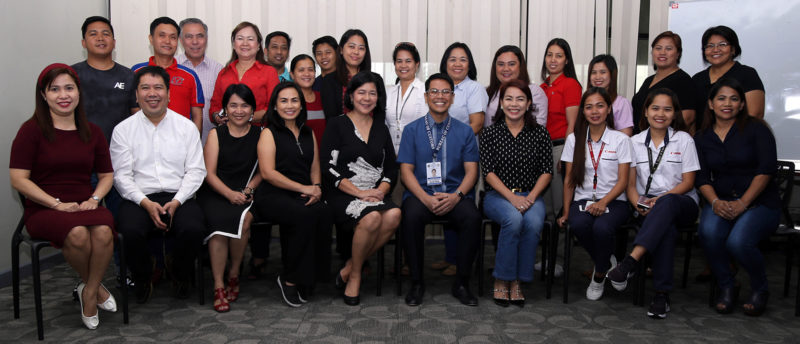
The Bureau of Customs (BOC) Port of Manila (POM) is implementing measures to improve efficiency as it aims to complete each transaction within the day, provided requirements are complete.
New BOC-POM district collector Atty. Erastus Sandino Austria, in a speech during a dialogue with stakeholders on April 18, said his first move upon assuming office was to implement a “no pending policy” at POM’s Formal Entry Division (FED) to make operations efficient.
He said this is also being done so BOC-POM can match the production efficiency of Asian Terminals Inc. (ATI), which operates Manila South Harbor on a 24/7 basis.
Before his appointment as district collector of POM early this month, Austria was the district collector of Davao, which he headed from April 2017 until March 2018.
He noted that the goal at POM is to conclude transactions in one day, in line with BOC’s Citizen’s Charter which indicates the times allotted for completing each stage in the process.
With the no pending policy, Austria said he is closely monitoring the performance of POM examiners, adding that those with pending transactions must complete them first before being given new ones. He has also set up three desks at the FED office, which essentially comprise a one-stop shop where he, the POM’s FED chief, and the deputy collector for assessment stay on certain hours of the day to immediately address concerns of examiners.
BOC-POM has also set up a system to hasten examination of alerted shipments so as to comply with the order of Customs commissioner Isidro Lapeña to process alerted shipments within 24 hours, and, under certain circumstances, in 48 hours.
A team from BOC-POM is likewise in close coordination with ATI for the fast transfer of alerted shipments to the examination area, with examiners informed in advance of their schedules for examination.
Asked if he would replicate measures he implemented in Davao, Austria noted that POM and Davao are different, as Davao has more exports and gets majority of its revenues from oil imports. Manila, which has a more diverse set of clients that primarily import, has mostly containerized shipments.
“I think what is very important for me and my team is to be flexible and that we have to understand the terrain, our area of responsibility, so that our policies will be responsive to the requirements of the clients,” he said.
“It’s not about the number of people we have. It’s not about the size of the port where we operate but rather how efficient our individual offices are and this is the key, I think, for us to collectively hit our targets and our goals,” Austria explained.
He said that with these measures, he is optimistic POM would hit its revenue target for April. He noted that when he assumed office, he inherited a 20% cumulative deficit, but as of April 18, collection is already about 2% positive.
BOC-POM has been tasked to collect a total of P89.9 billion for 2018 or anywhere from P6 billion to P8 billion in revenues monthly.
Prior to formally assuming the post of POM district collector, Austria said he inquired about problems at the port from predecessors and verified them with stakeholders and the port operator.
Based on these, he categorized problems as requiring short-, medium-, or long-term solutions.
“If I do get to stay on, then that will give me enough time to look into the medium-term solutions, the long-term solutions,” he noted.
It may be recalled that under Lapeña’s current policy, district collectors and other officials and officers with assessment functions will be replaced if they do not hit their monthly revenue target.
Austria’s solutions include improving POM’s facilities and increasing the competence of personnel through seminars and trainings.
“If we expect more from our people, we have to invest in them,” Austria said.
Alerted shipments
On preventing a repeat of the unauthorized release of 105 alerted shipments from POM last March, Austria said stop-gap measures have been put in place. He said he has given ATI a new format for documents needed in the release of alerted shipments, as well as specimen signatures from BOC officials that should be present in such documents.
BOC-POM has also authorized a specific person to send the required documents from BOC to ATI for the release of alerted shipments.
Austria said this is will “reduce or totally eliminate chances of anybody or any spurious documents circulating” that will try to lift alerted shipments without proper clearances from BOC.
As a medium-term solution, Austria said BOC will be given access to ATI’s system to be able to immediately inform the port operator if a shipment has been issued an alert order.
The long-term solution, Austria said, is to modernize BOC’s IT system, which is a priority of Lapeña’s.
Austria clarified that the new measures put in place are “in no way an admission on the part of the Bureau of Customs that there were lapses [on the side of] BOC” which resulted in the unauthorized release of the 105 alerted containers.
He said the new management of BOC-POM is moving forward from the incident, which is now in the hands of the court. – Roumina Pablo





